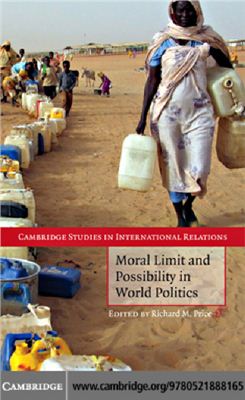Cambridge University Press, 2008. 309 p.
At what point can we concede that the realities of world politics require that moral principles be compromised, and how do we know when a real ethical limit has been reached? This volume gathers leading constructivist scholars to explore the issue of moral limit and possibility in global political dilemmas. The contributors examine pressing ethical challenges such as sanctions, humanitarian intervention, torture, the self-determination of indigenous peoples, immigration, and the debate about inteational criminal tribunals and amnesties in cases of atrocity. Their analyses entail theoretical and empirical claims about the conditions of possibility and limits of moral change in world politics, therefore providing insightful leverage on the ethical question of ‘what ought we to do? ’ This is a valuable contribution to the growing field of normative theory in Inteational Relations and will appeal to scholars and advanced students of inteational ethics and political theory.
Moral limit and possibility in world politics.
Constructivism and the structure of ethical reasoning.
The role of consequences, comparison and counterfactuals in constructivist ethical thought.
Sovereignty, recognition and indigenous peoples.
Policy hypocrisy or political compromise? Assessing the morality of US policy toward undocumented migrants.
Lie to me: sanctions on Iraq, moral argument and the inteational politics of hypocrisy.
Paradoxes in humanitarian intervention.
Inevitable inequalities? Approaching gender equality and multiculturalism
Interstate community-building and the identity/difference predicament.
Progress with a price
At what point can we concede that the realities of world politics require that moral principles be compromised, and how do we know when a real ethical limit has been reached? This volume gathers leading constructivist scholars to explore the issue of moral limit and possibility in global political dilemmas. The contributors examine pressing ethical challenges such as sanctions, humanitarian intervention, torture, the self-determination of indigenous peoples, immigration, and the debate about inteational criminal tribunals and amnesties in cases of atrocity. Their analyses entail theoretical and empirical claims about the conditions of possibility and limits of moral change in world politics, therefore providing insightful leverage on the ethical question of ‘what ought we to do? ’ This is a valuable contribution to the growing field of normative theory in Inteational Relations and will appeal to scholars and advanced students of inteational ethics and political theory.
Moral limit and possibility in world politics.
Constructivism and the structure of ethical reasoning.
The role of consequences, comparison and counterfactuals in constructivist ethical thought.
Sovereignty, recognition and indigenous peoples.
Policy hypocrisy or political compromise? Assessing the morality of US policy toward undocumented migrants.
Lie to me: sanctions on Iraq, moral argument and the inteational politics of hypocrisy.
Paradoxes in humanitarian intervention.
Inevitable inequalities? Approaching gender equality and multiculturalism
Interstate community-building and the identity/difference predicament.
Progress with a price

